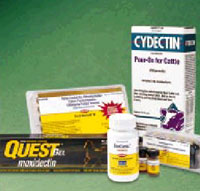|
Fort Dodge
Animal Health introduced
an improvement in the control of heartworm disease
in dogs with the launch of ProHeart SR12.
|
|
 As
a world leader in animal health products, Fort Dodge Animal Health offers
a wide range of biologicals and pharmaceuticals for the livestock, swine
and poultry industries as well as for companion animals, such as dogs,
cats and horses. Global sales of Fort Dodge products grew by 20 percent
to nearly $800 million in 2000. As
a world leader in animal health products, Fort Dodge Animal Health offers
a wide range of biologicals and pharmaceuticals for the livestock, swine
and poultry industries as well as for companion animals, such as dogs,
cats and horses. Global sales of Fort Dodge products grew by 20 percent
to nearly $800 million in 2000.
Innovative Fort Dodge biologicals include: LymeVax,a vaccine for
canine Lyme disease; Fel-O-Vax vaccines for multiple feline diseases;
Fluvac vaccine for equine herpes virus and influenza; and Bursine
vaccine for infectious bursal disease in chickens. Key pharmaceutical
products include: Cydectin Pour-On for parasite control in beef
and dairy cattle; EtoGesic tablets for canine osteoarthritis; and
Quest Gel dewormer and boticide for horses.
In 2000, Fort Dodge introduced an improvement in the control of heartworm
disease in dogs with the launch of ProHeart SR12 in Australia.
Until the advent of ProHeart SR12, the most common way to prevent
heartworms was with daily or monthly tablets administered by pet owners-
an approach that frequently results in poor compliance. With ProHeart
SR12, a dog receives a single injection from a veterinarian, protecting
the animal for a full year. Fort Dodge expects to launch this product
in the United States and Japan during 2001.
Another unique Fort Dodge product recently launched in the United States
under conditional license is a vaccine to aid in the prevention of Equine
Protozoal Myeloencephalitis (EPM)-a serious disorder that attacks the
central nervous system of horses. Symptoms of EPM can include seizures,
muscle atrophy and paralysis, but the condition is difficult to diagnose,
and current treatments can cost thousands of dollars. Fort Dodge's vaccine
is the first ever available for the prevention of this debilitating condition.
Innovative products in the animal health R&D pipeline include: West Nile
Encephalitis vaccines for companion animals (in conjunction with the Centers
for Disease Control and Prevention); a Feline Immunodeficiency Virus vaccine;
and food safety treatments such as a poultry Salmonella vaccine.
|
